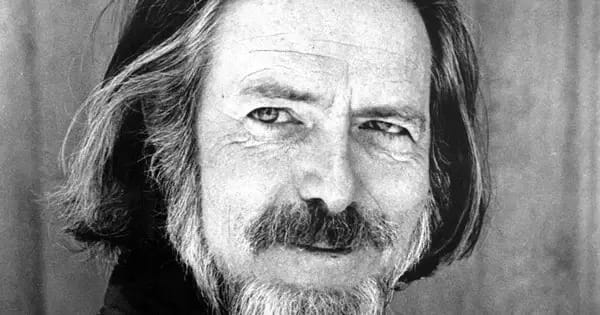🌀🐇 #248 Alan Watts on happiness, supracellular meditation, stream of life
Plus Physicist Richard Feynman on Beauty of a Flower
⚡️ Enlightening Bolts
📞 The Goodbye Line: A free, community art project where you can say the goodbyes you never got to. Call the number to share your goodbye or hear the goodbyes of others. Listen here.
🕸️ The Supracellular Meditation. In this piece, Sophie Strand explores how consciousness flows through rivers, fungi, animals, and ecosystems, urging us to think with the whole web of life. Read here.
🌼 Physicist Richard Feynman on Beauty of a Flower: Far from stripping away mystery, Feynman insist that science reveals even more to admire in the world around us. Read it here.
💌 Want More? Down The Rabbit Hole readers also enjoy these awesome (and completely free!) newsletters. Explore
🎇 Image of The Week
Gary Greenberg’s work uses powerful microscopes to reveal the hidden beauty of sand. By zooming in hundreds of times, he transforms tiny grains into intricate, colorful worlds that look like jewels. This image is of zoomed-in beach sand, collected from coastal areas rich in coral, shells, and volcanic minerals. His images show that when we pay close attention to the smallest details, we uncover a sense of wonder often missed in everyday life. Learn more here.
🚪 Finding The Magic Door
I've been thinking a lot about Craig Chalquist's "Journey of Re-Enchantment." I've written about it before. It's a narrative structure distinct from the Campbellian Hero's Journey, which you've probably heard of before. It involves following breadcrumbs back to the world of wonder we left behind in childhood as we "grew up" and became skilled economic agents. Society molds us into particular kinds of box-checkers, and this forms a rigidity of mind that walls us off from that world of wonder. To find our way back, we must go through the "magic door."
Part of the trouble is that the adult world attempts to convince you that this world doesn't exist and that it was your youthful delusion that made you believe it ever was. They claim the door isn't real, and that's enough to keep you from ever looking. The wonder-erasers will parrot propaganda that this magic door leads to a world of unicorns and fairy dust. But that's not where it leads. It leads you back to where you are right now, just with eyes a bit more wide open.
You see, as we age and grow into adulthood, we come to understand things we didn't know as children. This is good, natural, and an important part of the maturation process. But it's not all "I once was blind and now I see." In the process of opening our eyes in some ways, we closed them in others. Walking through the magic door allows us to open our eyes again and rediscover the magic in the mundane.
The clouds, the trees, the ants, the wind, the moon, the shadows, the sun-drenched coin you passed on the road—all are whispering to you in the foreign tongue of wonder. You used to be fluent before you knew these things had names. We confuse knowing the name with knowing them. We don't know them. We can never fully know them. But we can drop the pretense that we do.
Then, we might find the doorknob that opens the magic door. I promise you, your inner child left it unlocked.
🌊 Stream of Life
Enjoy this piece from poet Rabindranath Tagore:
“The same stream of life that runs through my veins night and day runs through the world and dances in rhythmic measures. It is the same life that shoots in joy through the dust of the earth in numberless blades of grass and breaks into tumultuous waves of leaves and flowers. It is the same life that is rocked in the ocean cradle of birth and of death, in ebb and in flow. I feel my limbs are made glorious by the touch of this world of life, and my pride is from the life-throb of ages dancing in my blood this moment.”
🤓 Learn This Word
Suerza: A feeling of quiet amazement that you exist at all; a sense of gratitude that you were even born in the first place, that you somehow emerged alive and breathing despite all odds, having won an unbroken streak of reproductive lotteries that stretches all the way back to the beginning of life itself.
⏳ From The Archives
A hand-picked link from a previous edition of 🌀🐇
An Antidote to the Age of Anxiety: Alan Watts on Happiness and How to Live with Presence
“How we spend our days is, of course, how we spend our lives,” Annie Dillard wrote in her timeless reflection on presence over productivity — a timely antidote to the central anxiety of our productivity-obsessed age. Indeed, my own New Year’s resolution has been to stop measuring my days by degree of productivity and start experiencing them by degree of presence. But what, exactly, makes that possible?
This concept of presence is rooted in Eastern notions of mindfulness — the ability to go through life with crystalline awareness and fully inhabit our experience — largely popularized in the West by British philosopher and writer Alan Watts (January 6, 1915–November 16, 1973), who also gave us this fantastic meditation on the life of purpose. In the altogether excellent 1951 volume The Wisdom of Insecurity: A Message for an Age of Anxiety, Watts argues that the root of our human frustration and daily anxiety is our tendency to live for the future, which is an abstraction. He writes:
If to enjoy even an enjoyable present we must have the assurance of a happy future, we are “crying for the moon.” We have no such assurance. The best predictions are still matters of probability rather than certainty, and to the best of our knowledge every one of us is going to suffer and die. If, then, we cannot live happily without an assured future, we are certainly not adapted to living in a finite world where, despite the best plans, accidents will happen, and where death comes at the end.
What keeps us from happiness, Watts argues, is our inability to fully inhabit the present:
The “primary consciousness,” the basic mind which knows reality rather than ideas about it, does not know the future. It lives completely in the present, and perceives nothing more than what is at this moment. The ingenious brain, however, looks at that part of present experience called memory, and by studying it is able to make predictions. These predictions are, relatively, so accurate and reliable (e.g., “everyone will die”) that the future assumes a high degree of reality — so high that the present loses its value.
But the future is still not here, and cannot become a part of experienced reality until it is present. Since what we know of the future is made up of purely abstract and logical elements — inferences, guesses, deductions — it cannot be eaten, felt, smelled, seen, heard, or otherwise enjoyed. To pursue it is to pursue a constantly retreating phantom, and the faster you chase it, the faster it runs ahead. This is why all the affairs of civilization are rushed, why hardly anyone enjoys what he has, and is forever seeking more and more. Happiness, then, will consist, not of solid and substantial realities, but of such abstract and superficial things as promises, hopes, and assurances.
🎬 Endnote
I hope you enjoyed this issue of Down The Rabbit Hole. Feel free to reply and tell me what you think.
Want to help spread the word?
I love sharing these gems of wisdom and wonder with you each week. If you love receiving them and want to help me spread the word, here is one quick way you can do that:
Forward this email to one friend.
That's it. It will take 5 seconds and will help me spread the good vibes and reach more people. I appreciate you.
With Wonder,
Mike Slavin





